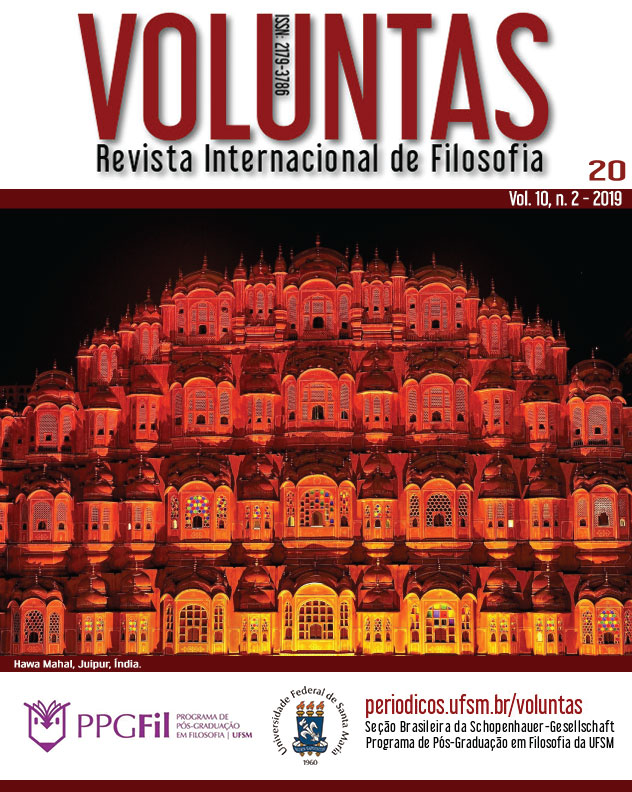Sufism and Taoism: from Shamanism to philosophical formulation
DOI:
https://doi.org/10.5902/2179378638897Keywords:
Sufism, Taoism, Izutsu, Mysticism, ShamanismAbstract
In his work Sufism and Taoism, Toshihiko Izutsu drew a parallel between these two apparently disparate schools of thought. One of the crucial factors that supports Izutsu’s comparative study is the shamanic origin of both paths of wisdom. Assuming this origin as correct, we intend to discuss in this paper how these “shamanic experiences” could have originated such elaborate and sophisticated philosophies. This will be achieved through questioning the place of both phenomena in face of religion and philosophy, discussing the meaning of Sufism and proceeding to their characterization as experiences that can only be understood in the scope of mysticism, that, in some aspects, differs from religion and philosophy.
Downloads
References
BAKRI, Aladdin, “Oneness of Being (waḥdat al-wujūd)”, Journal of the Muhyiddin Ibn 'Arabi Society, Volume 51, 2012, disponível em http://www.ibnarabisociety.org/articles/oneness-of-being.html.
BERGSON, Henri. As Duas Fontes da Moral e da Religião. Rio de Janeiro: Zahar, 1978.
CHENG, Anne. História do Pensamento Chinês. Petrópolis: Vozes, 2008.
CHITTICK, William C. Imaginal Worlds: Ibn al-'Arabi and the Problem of Religious Diversity. New York: SUNY Press, 1994.
CHODKIEWICZ, Michel. Seal of the Saints: Prophethood and Sainthood in the doctrine of Ibn ‘Arabi. Cambridge: The Islamic Texts Society,1993.
DAFTARY, Farhad. Ismailis in Medieval Muslim Societies. London/New York: I.B. Tauris; The Institute of Ismaili Studies, 2005.
ELIADE, Mircea. O Xamanismo e as Técnicas Arcaicas do Êxtase. São Paulo: Martins Fontes, 1998.
IBN AL ‘ARABI, The Meccan revelations (Futûhât al Makkiya) 2 vols. New York: Pir Press, 2004.
IBN ARABI, Viaje al Señor del Poder (Risalat al-anwar...). Málaga: Editorial Sirio, 1988.
IZUTSU, Toshihiko. Sufismo y Taoísmo. (2 vols). Madrid: Siruela, 2004.
NURBAKHSH, Javad. Simbolismo Sufi – Vol. 3. Madrid: Editorial Nur, 2005.
RIZVI, Sajjad H. “Communicating Pure Consciousness Events: Using lzutsu to Address a Problem in the Philosophy of Mysticism”. In, THOHA, A. M. (org.) Japanese Contribution to Islamic Studies: The Legacy of Toshihiko Izutsu Interpreted. Kuala Lumpur: IIUM Press and Japan Foundation, 2010. pp. 157-170.
SCHIPPER, Kristofer; VERELLEN, Franciscus (eds), The Taoist Canon: A Historical Companion to the Daozang, Chicago: Chicago University Press, 2004.
SULAMI. La Lucidez Implacable: Epístola de los hombres de la reprobacion (Risalat al-Malâmatiyya). Barcelona: Ediciones Obelisco, 2003.
SVIRI, Sara. “Hakîm al-Tirmidhî and the Malâmatî movement in early Sufism.'' In L. Lewisohn (ed.), Classical Persian Sufism. London: KNP. 1993, 583-613.
TEISER, Stephen F., VERELLEN Franciscus. “Buddhism, Daoism, and Chinese Religion”. In: Cahiers d'Extrême-Asie, vol. 20, 2011. pp. 1-12.
TEROL ROJO, Gabriel. Lectura de la relación religiosa y filosófica del daoísmo chino. Actas del XI Congreso Andaluz de Filosofía: Filosofía y religión, retos y desafíos actuales, Granada: AAFI, 2016. p. 230-241.
TAKESHITA, Masataka. “Toshihiko Izutsu's contribution to Islamic Studies”. Journal of International Philosophy. 2016, p. 78-81.
THOHA, Anis Malik. “Izutsu’s approach to the comparative study of religions: an assessment of his Sufism and Taoism”. Japanese Contribution to Islamic Studies: The Legacy of Toshihiko Izutsu Interpreted. Kuala Lumpur: IIUM Press and Japan Foundation, 2010. pp. 181-190.
TOUSSULIS, Yannis. Sufism and the way of blame. Wheaton: Quest Books, 2010.
WONG, Eva. Taoism: An Essential Guide. Boston: Shambhala Publications, 1997. (1a edição 1951).
Published
How to Cite
Issue
Section
License
The submission of original manuscripts to this journal implies the transference, by the authors, of the copyrights for printed and digital publication. The copyrights of a published manuscript belong ultimately to the author, and only the copyright for its first publication is reserved to the journal. Authors may only use the same results in other publications explicitly indicating this journal as the medium of the original publication.
Licence
Attribution-NonCommercial-ShareAlike 4.0 International (CC BY-NC-SA 4.0) - This license lets others remix, tweak, and build upon your work non-commercially, as long as they credit you and license their new creations under the identical terms.






